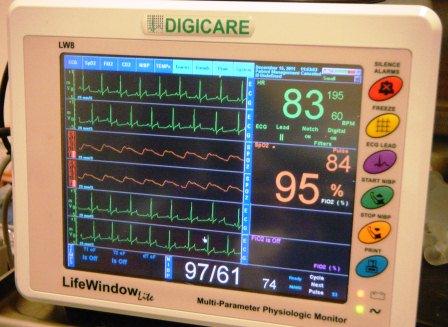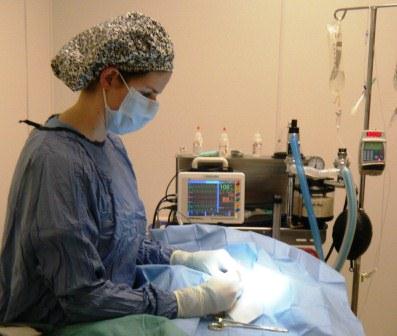|
Health Benefits for Spaying Female Dogs and Cats:
-Prevent unwanted puppies/kittens and the potential for a c-section or delivery complications
-Prevent against pyometra, a potentially fatal uterine infection
-Mammary cancer prevention: In female dogs spayed prior to the first heat cycle, mammary cancer occurs in less than 1% of dogs. In dogs spayed after the first heat cycle, the incidence rises to 7% and in dogs spayed after the second heat cycle, the cancer rate is 25%.
Health Benefits for Neutering Male Dogs and Cats:
-Significantly reduce the potential for prostate infections and enlargement
-Decreased aggression, dominance related problems and roaming
-Decreased urine marking
-In male cats, a decreased risk of Feline AIDs (FIV) and other diseases spread by mating
Surgery at Nixa Animal Hospital:
Your pet should be dropped off for surgery between 7:30 am and 8:30 am - Withhold food the night before after midnight, and water the morning of surgery starting at 7:30am.
1. An exam is performed by Dr. Molly on the pet, and if needed, blood samples taken for pre-anesthetic blood testing to check kidney and liver values.
2. A pre-medication of morphine is administered to sedate the pet, prevent pain and anxiety - seen below

3. After the pet is sedate, an intravenous catheter is placed in the front leg to allow medications and IV fluids to be administered
4. An IV injection of propofol, a short acting anesthetic, is given to induce anesthesia

5. An endotracheal tube is placed in the windpipe to protect the airway and administer anesthesia

6. Isoflorane gas anesthesia and oxygen are delivered with an anesthesia machine to maintain the pet under anesthesia
7.The pet is attached to an EKG to monitor the heart rate, a blood pressure monitor to assure proper blood flow is occurring, an oxygen saturation monitor to assure the pet is breathing properly and oxygenating normally, and a temperature monitor.
8. A veterinary assistant monitors all of the results and charts them to look for any signs the pet may be having difficulty under anesthesia

9. The pet is then prepped for surgery by shaving the abdomen and cleaning the surgical area with an antibacterial solution
10. The pet is moved from the prep area to the surgery room, while Dr. Molly scrubs for surgery and dresses in a sterile gown and gloves for surgery
11. A sterile drape is placed over the pet and the surgery begins
12. A 1-3 inch abdominal incision is made along the middle of the lower abdomen. The ovaries, fallopian tubes and uterus are removed, the blood vessels and tissue are ligated with suture to prevent bleeding

13. The abdominal wall is closed with absorbable suture in 3 layers, typically skin sutures are not visible and do not require removal
14. Your pet is closely monitored until they are alert and the breathing tube has been removed
15. All pets are sent home with an oral pain medication for 5 days
Typically pets are sent home after 3:30pm and Dr. Molly or one of our highly skilled technicians will discuss all instructions with you when your pet is discharged from the hospital.
Our pricing for spay surgeries includes all of the above, the only additional charge is for pre-anesthetic blood testing or if an e-collar is needed to prevent licking at the incision.
Spay Surgery Package < 20 lbs $175
21 to 50 lbs $185
51 to 75 lbs $225
>76 lbs $275
When deciding on a veterinarian to perform your pet's surgery, please take the time to discuss pain management, anesthetic protocols, and anesthesia monitoring. Your pet's safety and comfort should always be the first priority.
Pre-anesthesia blood testing $48.00
E-collar $11.50 plus tax
|